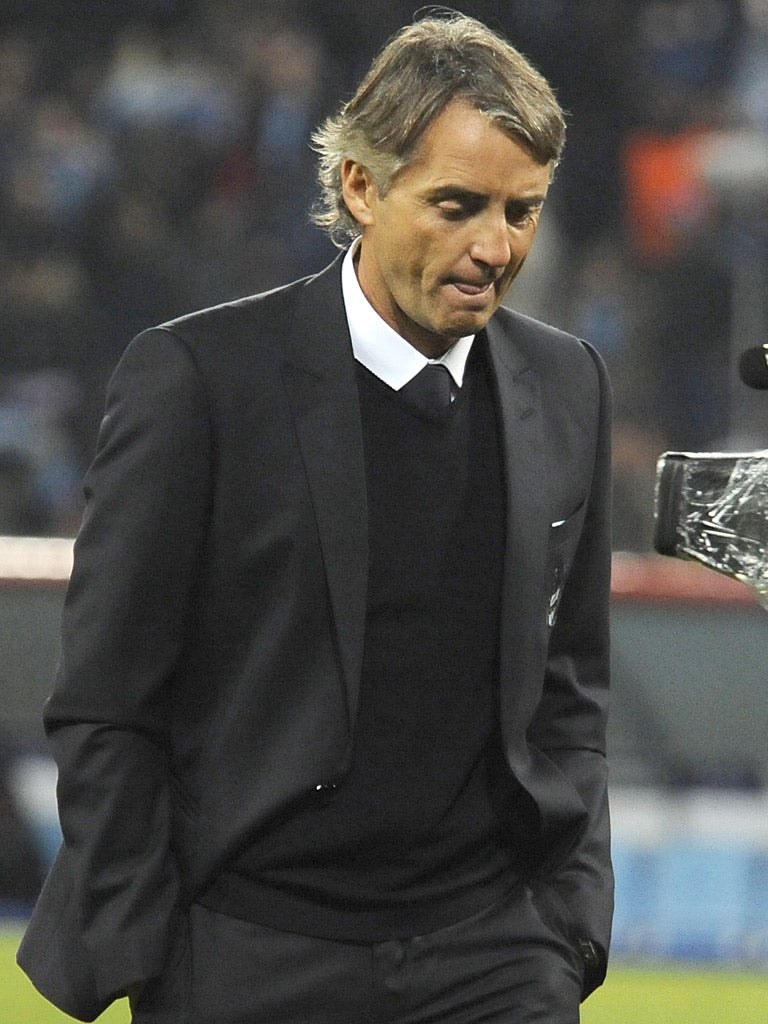Ian Herbert: Mancini uncertain about way forward
Manager's conflicting offensive and defensive impulses have been reflected in his obvious indecision about Nigel de Jong

Your support helps us to tell the story
From reproductive rights to climate change to Big Tech, The Independent is on the ground when the story is developing. Whether it's investigating the financials of Elon Musk's pro-Trump PAC or producing our latest documentary, 'The A Word', which shines a light on the American women fighting for reproductive rights, we know how important it is to parse out the facts from the messaging.
At such a critical moment in US history, we need reporters on the ground. Your donation allows us to keep sending journalists to speak to both sides of the story.
The Independent is trusted by Americans across the entire political spectrum. And unlike many other quality news outlets, we choose not to lock Americans out of our reporting and analysis with paywalls. We believe quality journalism should be available to everyone, paid for by those who can afford it.
Your support makes all the difference.The irony of it all is that Edinson Cavani seemed to be a symbol of what Manchester City didn't want, when one of the club's most senior executives met his agent his summer. At a football stadium on the continent, City's man had just finished telling Cavani's how Uefa's financial fair play regime meant the days of the club paying over the odds to attract players were over when it became clear he was wasting his breath. "So, about my player," the agent struck up. "We're talking €50m [£43m]. Great value..."
Though the arrival of Sergio Aguero – at £38m, always City's first choice – was more than adequate compensation, you can now see why Roberto Mancini encouraged the initial contact. City might have around £122m of strike force at their disposal but the fireworks are not always of the right type, nor at the right moments.
The Manchester City manager's weak and confused explanation of another bizarre 24 hours in the life of Mario Balotelli – pizza with the girlfriend, complaints of sickness, a goal and several spurned opportunities – does not obscure the fact that he is not to be relied on.
A headline in the Italian press, meanwhile, perhaps best told the story of Edin Dzeko's latest Champions League malfunction: Milner ispirato, Dzeko invisible. But as Mancini reflects on the likelihood of City becoming the first British team new to the Champions League to fall at the group stage since Kenny Dalglish's Newcastle United in 1997, he knows that the problems go deeper than his forwards. Right back into the core of his side, in fact, where the personnel at his disposal have left him torn between a desire to attack and to defend.
Mancini is in good company. Sir Alex Ferguson felt the same nearly a decade ago when his Manchester United side's European defeats, home and away, to Bayern Munich in April 2001, led him to believe that the quintessentially English 4-4-2 was too airy for the rigours of Europe. "Maybe we need to get new players, break it up, start again," Roy Keane reflected at that time and Ferguson duly dismantled the class and structure of '99, paying £28m to Lazio for Juan Sebastian Veron to break forward from a more fortified midfield and Ruud van Nistelrooy as a lone striker.
Mancini's side in Naples on Tuesday night reflected a similar lack of appetite for airiness. Pablo Zabaleta's selection above Micah Richards was roundly criticised by City supporters yesterday but the logic behind it was reasonable given Mancini's view – and it's one thing he shares with Fabio Capello – that Richards' attacking zeal does not always adequately compensate for the defensive vulnerability which Franck Ribéry exposed so ruthlessly in Munich in September. Sadly, Zabaleta's lack of pace was even more grievous, with Ezequiel Lavezzi buzzing around him. Conversely, Aleksandar Kolarov played ahead of Gaël Clichy for offensive reasons: Mancini thought Balotelli's pace would open up space for the Serb on the overlap. That failed, too.
Mancini's conflicting offensive and defensive impulses have also been reflected in his obvious indecision about Nigel de Jong – left out in Munich, hastily reinstated there after 55 minutes (that's what caused the fateful row with Carlos Tevez), selected once again in Naples but the first man to be hooked when a flaccid, static City looked in need of creativity.
A player who can both repel teams and open them up in Europe is what Mancini wants and it is actually someone Ferguson thought he had found four years ago when he signed Owen Hargreaves from Bayern Munich, with Europe in mind. The notion of Hargreaves delivering for City what his wretched injury record prevented at United would be some story, though the odds remain stacked against it. On the long road to recuperation, he still trains apart from the senior squad.
Milner could not explain, when he stopped on his trudge through Napoli's crumbling old stadium late on Tuesday night, why City could not locate the success in Europe which they have found in the league. "I don't know," he said. "It's just a different style [in Europe], who knows? We've given away two goals as a team and you can't afford to do that."
If Mancini's quandaries cause him any dark moments between now and the arrival on 7 December of Bayern Munich – whose desire to avoid City in the knock-out stages are a big incentive to keep their foot on the pedal – then Ferguson's attempts to create a style for Europe may not be terribly uplifting.
It was just as well Mancini was turning the key in his front door in Alderley Edge at 4.30am yesterday morning – and not around in Italy to read Gazzetta dello Sport's breathless headline: Cavani abatte il City. Cavani batters City.
Join our commenting forum
Join thought-provoking conversations, follow other Independent readers and see their replies
Comments